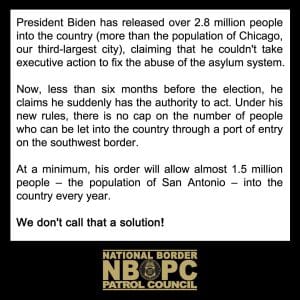Department of Homeland Security (DHS) Compensation Reform Plan
Description of DHS plan: The Department of Homeland Security (DHS) pay reform plan would substitute Law Enforcement Availability Pay (LEAP) for the current system of Administratively Uncontrollable Overtime (AUO) and Fair Labor Standards Act (FLSA) pay for all Border Patrol agents. This would eliminate all compensation for work beyond 10 hours a day and force them to work for free.
The DHS plan claims it will achieve uniformity in the current overtime system; however, that is not possible when DHS intends to leave Customs and Border Protection officers under the Customs Officer Pay Reform Act (COPRA). CBP officers receive COPRA overtime for all hours worked beyond eight hours a day, which doubles their normal pay rate for overtime worked.
Disadvantages of DHS compensation reform plan:
• Requires Border Patrol agents to work for free beyond ten hours a day.
• Allows the agency to schedule agents to work an infinite amount of hours for ZERO compensation.
• Reduces agents’ pay by an average of $7,000 a year (the only group of employees singled out for this sacrifice).
• Reallocates the so-called savings of $110 million to fund more unnecessary levels of management and increased salaries for each level.
• Further lowers morale.
NBPC Recommendation to Congress: Demanding that employees work for free is grossly unfair to frontline Border Patrol agents and their families. All federal law enforcement agents make sacrifices every day to uphold the laws of the United States, however this plan singles out Border Patrol agents asking them to go above and beyond. To date, 114 agents have made the ultimate sacrifice in the line of duty, more than any other federal agency.
On behalf of the 17,000 Border Patrol agents represented by the National Border Patrol Council (NBPC), Congress is urged to reject this ill-conceived proposal. The NBPC has developed an alternative plan that saves the government money, reforms the antiquated overtime policy currently used and protects the dedicated men and women of the United States Border Patrol.


